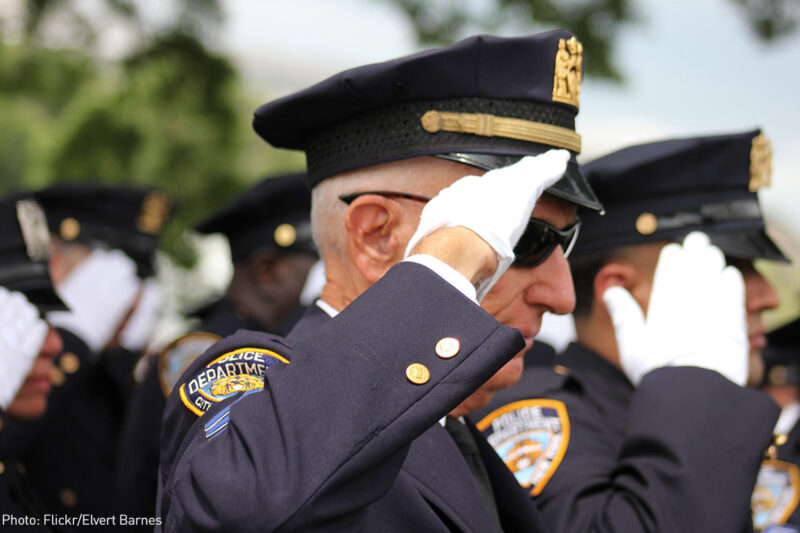8 Principles That Will Stop Police Practices That Harm Women and LGBT People


The numbers are startling.
Two in three domestic violence survivors surveyed recently by the National Domestic Violence Hotline said that they were somewhat or extremely afraid to call the police again in the future, with many saying that they thought police would not believe them or would make things worse. One in four who had previously contacted police said they would not seek their assistance again for domestic violence. Advocates who work with survivors reported a similar lack of trust and confidence in police to the ACLU and its partners.
But the Justice Department, in partnership with law enforcement agencies and advocates, is trying to change that.
This morning, Attorney General Loretta Lynch presented new and unprecedented national guidance on policing domestic and sexual violence. The guidance examines how gender bias can undermine police responses to sexual assault and domestic violence, particularly affecting women and LGBT individuals, and sets forth eight principles for policing these crimes free from discrimination. By highlighting the serious problem of gender and LGBT discrimination in policing, the attorney general declared that police misconduct in responding, and sometimes perpetrating, domestic and sexual violence is a civil rights issue.
This is a huge step forward and one that is sorely needed. In many communities, domestic violence and sexual assault survivors face harassment, violence, hostility, or dismissiveness from police. Here are some examples from just the past few weeks:
- The Associated Press uncovered nearly a thousand police officers who lost their licenses because they committed sexual misconduct, a number that is the tip of the iceberg given the difficulties of reporting sexual assault by law enforcement.
- Daniel Holtzclaw, a former Oklahoma City police officer, was just convicted of 18 sexual assault charges, including rape, because he used the authority of his badge to target African-American women for months.
- Two Boston police officers violated protocol in failing to confirm and enforce a domestic violence victim’s restraining order against her ex-boyfriend. He murdered her the next day, and the officers are now facing discipline.
The guidance is tremendously significant for LGBT people who are too often met with indifference or worse when reporting instances of domestic and sexual violence to law enforcement. It notes the alarming statistic that 61 percent of bisexual women have experienced rape, physical violence, and/or stalking by an intimate partner. In addressing how to properly investigate sexual assault or domestic violence complaints thoroughly and effectively, the guidance provides an example of a transgender woman whose partner hits her several times when he learns that she is transgender. In the example, the officers leave without taking a report, have sympathy for the man who feels “deceived,” and believe their efforts are better spent on more serious crimes. The guidance makes clear that this response constitutes discriminatory policing.
These stories of police misconduct are real, and we know that there are, unfortunately, many more just like them. But we also know this isn’t the whole story because every day, in communities across the country, police officers do the right thing and provide the protection victims seek and deserve. They interview victims with sensitivity, serve and enforce restraining orders, process rape kits, investigate cases thoroughly, and provide referrals for community resources — all without hostility based on the victim’s gender, sexual orientation, race, disability, religion, or immigration status. In the process, they support the victims who come forward, enforce domestic violence and sexual assault laws on the books, and help make victims and communities safer.
The guidance released today builds on DOJ’s important work addressing gender bias in police departments in New Orleans, Puerto Rico, and Missoula, Montana. It establishes a framework for preventing discriminatory policing of domestic and sexual violence, one that law enforcement, anti-violence advocates, civil and human rights advocates, and others committed to ending discrimination against survivors within the criminal justice system can rally around. It sets out the following eight basic principles that, if adopted by police departments, would prevent gender discrimination in law enforcement:
- Recognize and address biases, assumptions, and stereotypes about victims
- Treat all victims with respect and employ interviewing tactics that encourage a victim to participate and provide facts about the incident
- Investigate sexual assault or domestic violence complaints thoroughly and effectively
- Appropriately classify reports of sexual assault or domestic violence
- Refer victims to appropriate services
- Properly identify the assailant in domestic violence incidents
- Hold officers who commit sexual assault or domestic violence accountable; and
- Maintain, review, and act upon data regarding sexual assault and domestic violence.
The guidance is the result of years of advocacy by the ACLU and other civil rights, women’s rights, and anti-violence groups. After the Inter-American Commission on Human Rights concluded in 2011 that the U.S. violated the human rights of domestic violence survivor Jessica Lenahan and her children, we began pushing for broad reforms of the criminal justice system’s response to gender-based violence. Over 180 national, state, and local groups joined this effort. Law enforcement agencies also supported the guidance, because eliminating gender bias is essential to good policing.
The Justice Department deserves praise for its crucial work, both on the guidance and with police departments on domestic violence and sexual assault prevention and response. And this is just the beginning. There is much more work to do to change the lived experiences of survivors with the criminal justice system. The guidance provides the opportunity for law enforcement officials, advocates, and community members to examine how their communities are responding to domestic violence and sexual assault and what reforms are needed to prevent the discriminatory responses too many people face.
These collaborations are especially necessary because calls regarding domestic violence make up the single largest category of calls received by police departments in most communities. Unbiased police responses to domestic violence and sexual assault are key to creating a criminal justice system that is both fair and effective for everyone.

